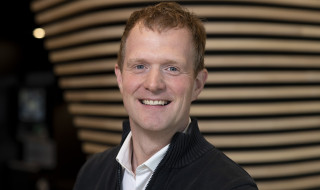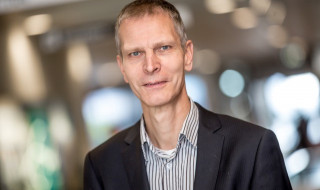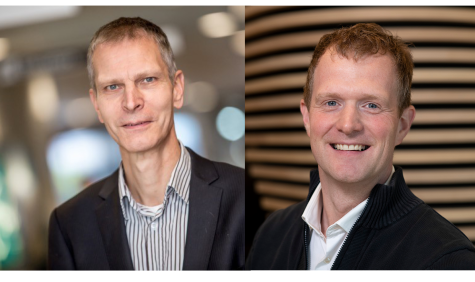Edubadges say something about students, but also about the course
For an employer, "soft skills" are at least as important as diplomas and theoretical knowledge. But how do you demonstrate that you are that team player with strong communication skills? Or that you present your ideas convincingly? The EUR sees a role for edubadges. But the university also wants to use edubadges in other ways.
"What do you do at the moment when you go to apply for a job where presentation is very important? Then you put on your CV that you are good at that. But suppose in doing so you could also hand over Erasmus University's edubadge Excellent Presenter? That makes your skill much more powerful."

Marijn van den Doel, Erasmus University Rotterdam
Speaking is educational consultant Marijn van den Doel at the Rotterdam School of Management (RSM) faculty of Erasmus University Rotterdam (EUR). We speak to him together with Coen Fierst van Wijnandsbergen, IT consultant at RSM. Marijn and Coen took their first steps into the world of digital certificates at the faculty a few years ago. In 2018-2019, RSM participated in the Open Badges pilot. "We chose then to do the pilot with informal education: we don't attach credits to the certificates. But that does not mean that our edubadges have no value. On the contrary."
Experience explicit
"Take mentoring," says Marijn. "For years there have been programmes where first-year students are mentored by second- or third-year students. Those students thereby gain important skills that don't count towards your degree. If you offset this with an edu badge, you give students who show extra commitment the chance to make their experience explicit. But as a university, you also show something. Namely which values you consider important. In this way, the badges not only say something about the student, but also something about the programme."
Flexibilisation and digitisation
Marijn came across the edubadges phenomenon about five years ago during a seminar where SURF led a session on the subject. "I had just started at RSM, but flexibilisation and digitisation of education are topics that have been close to my heart for years. I wanted to see how we could get started with this form of digital certificates, and I could count on Coen's advice and support in terms of technology."
As a university, issuing edubadges shows what values you consider important.
Signboard
"Incidentally, the biggest challenge turned out not to be in technology," says Coen. "That lay on the political and legal front. The project lead time ran out because a lot of coordination was needed with internal and external parties, such as the Legal department and SURF." Marijn: "There were more snags than expected. You have to properly determine what you want to issue edu badges for, but also how you deal with privacy and student data. Before I knew it, a multitude of colleagues had to be involved. The examination board had to think something of it AND a learning objective had to be defined. Ultimately, certificates - also in the form of digital badges - act as the institution's signboard, they stand for the quality of the education you offer. You don't want to take that lightly."
Look and feel

Coen Fierst van Wijnandsbergen, Erasmus University Rotterdam
"And there is a technical aspect," says Coen. "An edubadge has to be permanent. We have to be sure that the platform will still exist in 10 or 20 years' time. I understand that the university has to contractually seal that." "Not to mention the look and feel of the edubadges," Marijn adds. "Those also had to match the look and feel of the university and faculty. So marketing colleagues were also involved. But our efforts have paid off: lecturers and students are happy with them. Teachers have an extra tool to enthuse students and students can now demonstrate their skills. Meanwhile, I see that they abundantly share their obtained edubadges on their LinkedIn profiles."
Performance society
Marijn: "But we are not there yet. Students also indicate that we have to pay attention to the study load. We live in a performance society, they feel they have to do more and more to be attractive for the job market. So there are caveats. You shouldn't lose sight of those."
Some 650 edubadges have been awarded within RSM, for subjects such as Financial Accounting and Goal Setting.
Mature situation
Coen: "It does give satisfaction that we can now say that the pilot phase is officially complete. In 2021, we will have moved to a more formal and mature situation. Policy is now being developed and, based on our experiences, other faculties can get started with edubadges. EUR has now shared the ground rules with all faculties. A nice development is that the Erasmus Research Institute of Management might want to start using edubadges to reward researchers who have made themselves particularly deserving in a particular field. That is new, also for SURF. Very interesting."
Microcredentials
Some 650 edubadges have now been awarded within RSM, for subjects such as Financial Accounting and Goal Setting. "We have so far mainly focused on edubadges for extra curricular activities," says Marijn. "But you can use them in all kinds of ways in the curriculum, for instance as microcredentials: small pieces you can use to build your degree. So you could take study units at different institutes." Coen: "There are so many possibilities. I regularly look admiringly at what other educational institutions are doing with edubadges. Especially MBO courses have creative applications."
